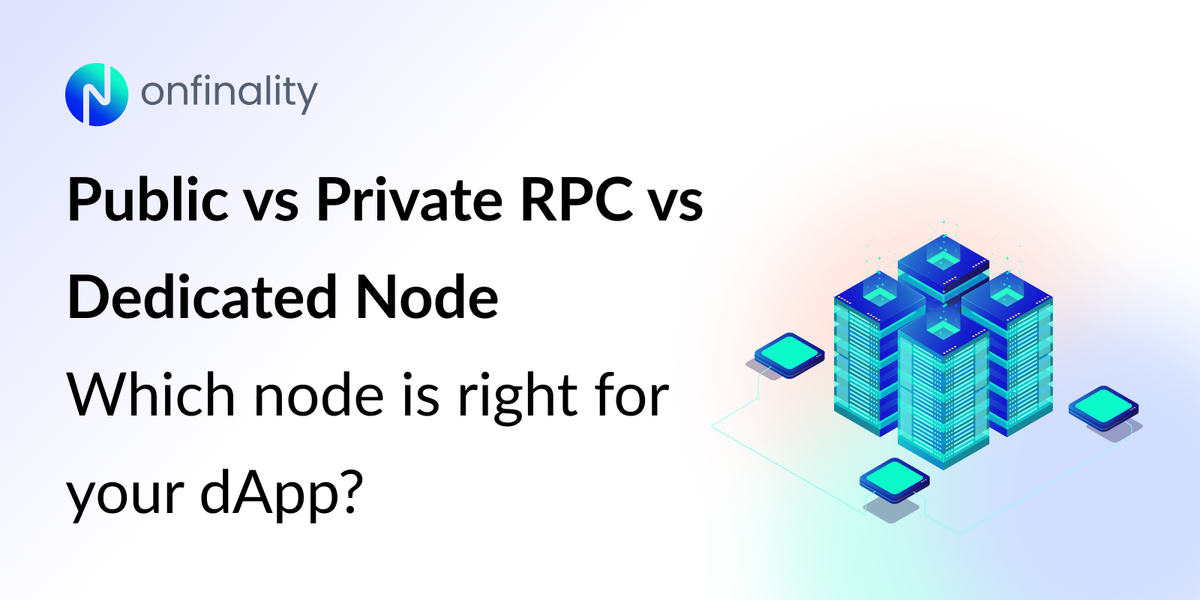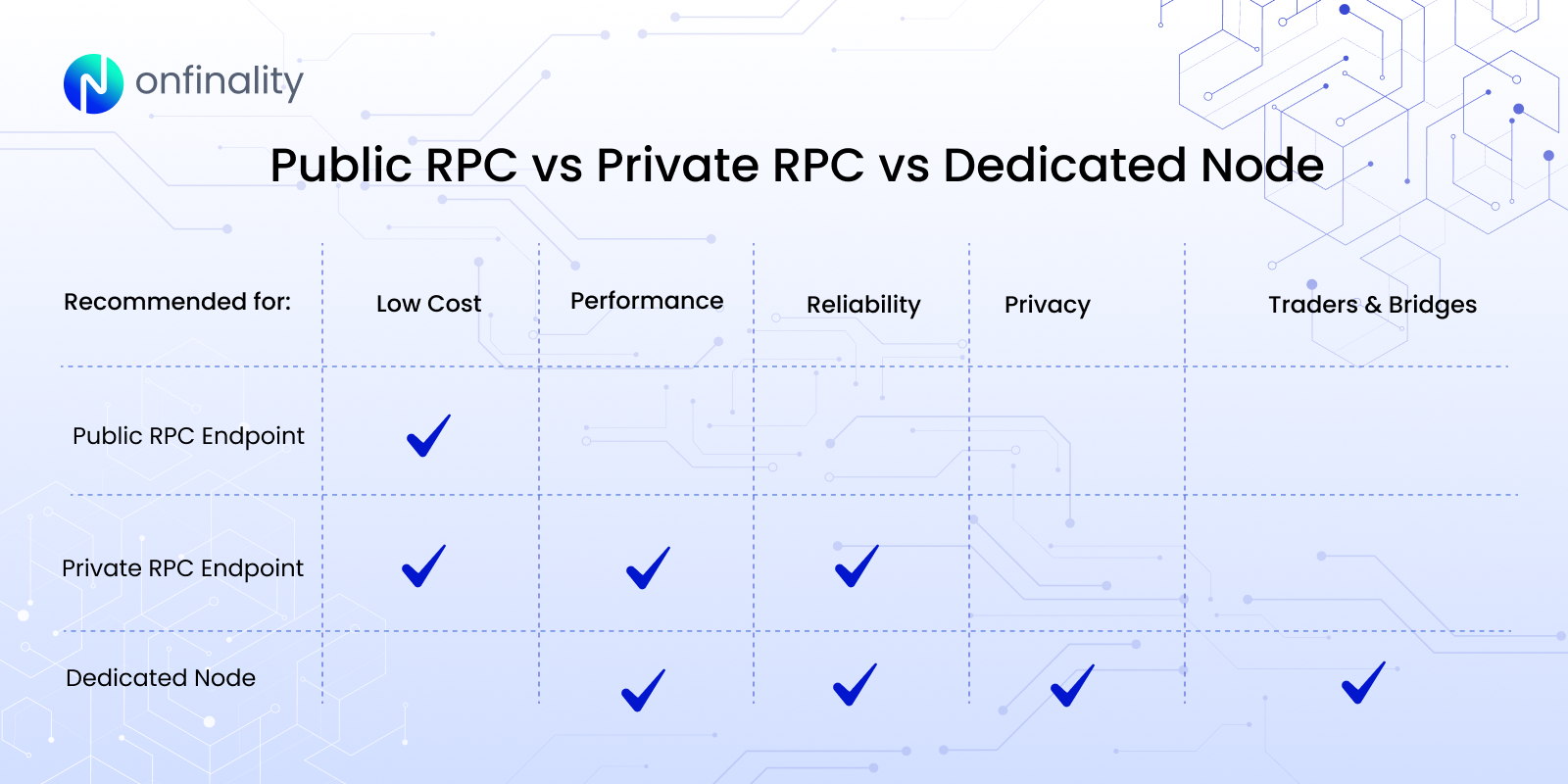Public RPC vs Private RPC vs Dedicated Blockchain Nodes: Which Node is Right for Your dApp?
Blockchain nodes allow dApps, wallets, and block explorers to interact with the network - but not all nodes are created equal. Choosing between a public RPC endpoint, private RPC node, or dedicated blockchain node can impact performance, security, and user experience.

Introduction
The right blockchain node is essential for building fast, reliable, and scalable applications. Blockchain nodes allow dApps, wallets, and block explorers to interact with the network - but not all nodes are created equal. Choosing between a public RPC endpoint, private RPC node, or dedicated blockchain node can impact performance, security, and user experience.
What is a Node in Blockchain?
A blockchain node is any computer that participates in a blockchain network. Nodes store a copy of the blockchain, validate transactions, and relay information across the network. Essentially, they form the backbone of the blockchain, ensuring data integrity and decentralization.
RPC nodes provide Remote Procedure Call access, allowing apps to read/write data without directly syncing the full chain.
Why It Matters:
- Nodes ensure security and decentralization.
- The type of node you connect to affects latency, reliability, and scalability.
- Choosing the right node is critical for applications like dApps, wallets, and block explorers.

Public RPC Endpoints
A public RPC endpoint is a shared node accessible to anyone, often for free, allowing developers to connect to a blockchain without running their own infrastructure.
Key Characteristics:
- Open access, usually no API key required.
- Free but with rate limits and occasional latency.
- Minimal or no support.
Use Cases:
- dApps testing or fully decentralized apps avoiding private resources.
- Wallets needing light decentralised access
- Block explorers providing educational or experimental insights.
Example:
- Solana public RPC endpoints are great for prototyping or early-stage dApps.
Private RPC Endpoints
A private RPC endpoint is also a shared node, but with preferential access, higher request limits, access to more methods, and often dedicated support.
Key Characteristics:
- Access limited to authorized users.
- Higher throughput than public RPC.
- Optional support for troubleshooting.
Use Cases:
- Medium-traffic dApps requiring stable performance.
- Wallets with hundreds of users.
- Block explorers showing near real-time blockchain data.
Pros:
- Improved stability
- Higher rate limits
- Access to more methods
- Optional support
Cons:
- Shared resource; not fully exclusive
- Performance can still be impacted by other users
Dedicated Blockchain Node
A dedicated blockchain node is a single-tenant node offering exclusive access, full control, and superior performance.
Key Characteristics:
- Exclusive access for your applications.
- Low latency, high throughput, fast response times.
- Fully managed updates and maintenance when using a provider like OnFinality.
Use Cases:
- High-performance dApps with time-sensitive operations like trading or DeFi protocols.
- Wallets processing large transaction volumes.
- Block explorers delivering live analytics across multiple chains.
- Traders who need faster on-chain transactions
Pros:
- Low latency and full control.
- Hands-off maintenance with providers like OnFinality.
- Faster transactions for miners and traders
Cons:
- Requires blockchain expertise if you run it yourself
- Higher cost
Comparative Overview
Choosing the Right Node
- Public RPC Endpoint: Best for experimental dApps and lightweight wallets
- Private RPC Node: Ideal for medium-scale apps needing higher reliability and support.
- Dedicated Node: Recommended for high-traffic, low-latency dApps, large wallets, bridges, traders, and multi-chain block explorers.
Common Questions About Blockchain Nodes
What is a blockchain node?
A blockchain node is a computer that stores blockchain data, validates transactions, and helps run dApps, wallets, and block explorers.
What is an RPC endpoint?
An RPC endpoint is a node interface that allows applications to read from and write to the blockchain via Remote Procedure Calls, without running a full node.
How much does it cost to run a blockchain node?
Costs vary: public RPC endpoints are free, OnFinality Private RPC nodes start at $49/month, and Dedicated Nodes start at $150/month, with fully managed maintenance included.
What is the difference between a public and private RPC?
Public RPC endpoints are free and shared, while private RPC nodes offer restricted access, higher performance, and optional support for production apps.
Final Thoughts
Selecting the right blockchain node is critical to your project’s performance, reliability, and scalability. Public RPC endpoints are ideal for small or experimental applications, private RPC nodes offer better stability for growing projects, and dedicated nodes, especially managed by OnFinality, provide unmatched performance, low latency, and hands-off infrastructure management.
Ready to scale your dApp, wallet, or block explorer? Run a node on OnFinality today and focus on building- not maintaining - Infrastructure.
About OnFinality
OnFinality is a blockchain infrastructure platform that saves web3 builders time and makes their lives easier. OnFinality delivers scalable API endpoints, nodes, AI Agents, and indexers for the biggest blockchain networks and empowers developers to automatically test, deploy, scale and monitor their own blockchain nodes in minutes.
To date, OnFinality has served hundreds of billions of RPC requests, supports over 125 networks including Avalanche, BNB Chain, Cosmos, Polkadot, Ethereum, and Polygon, and is continuously expanding these mission-critical services so developers can build the decentralised future, faster!
